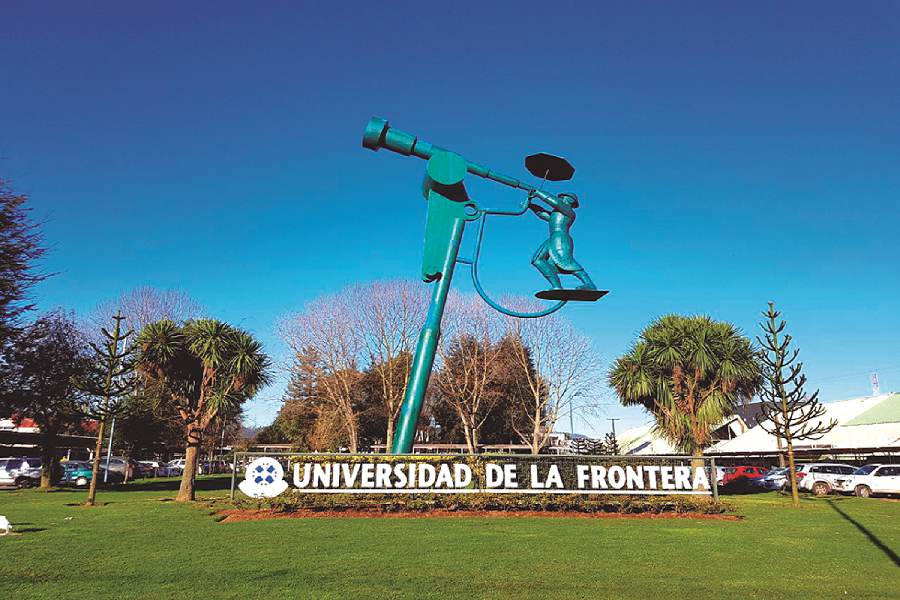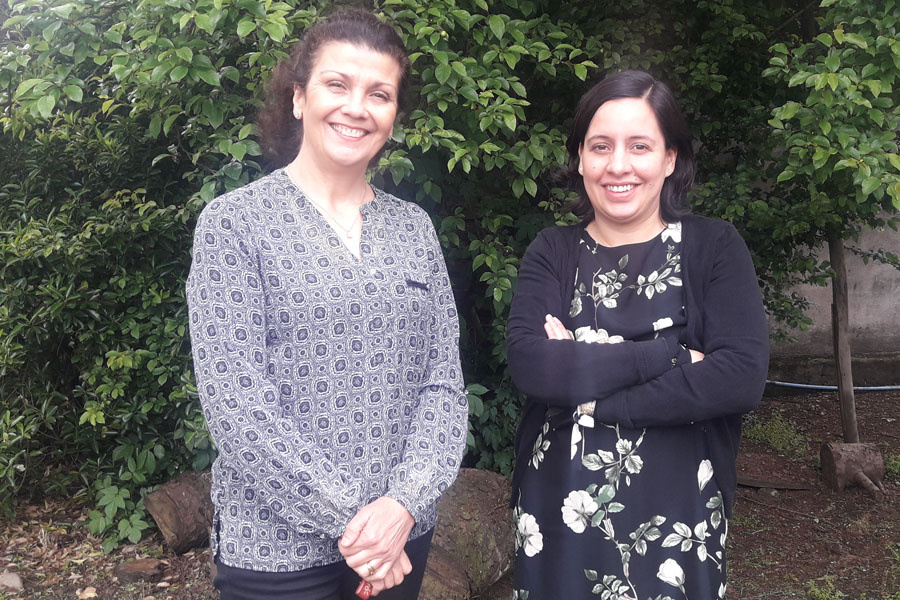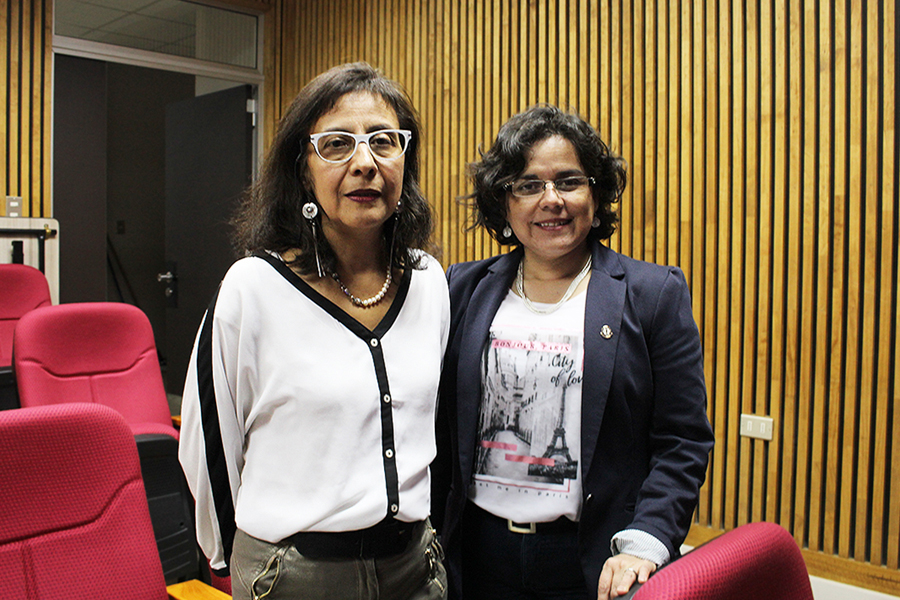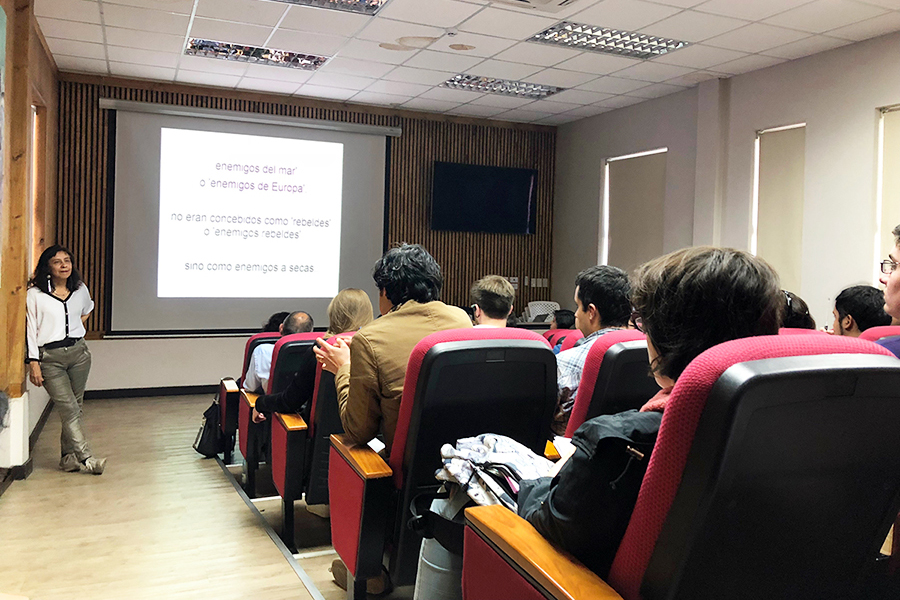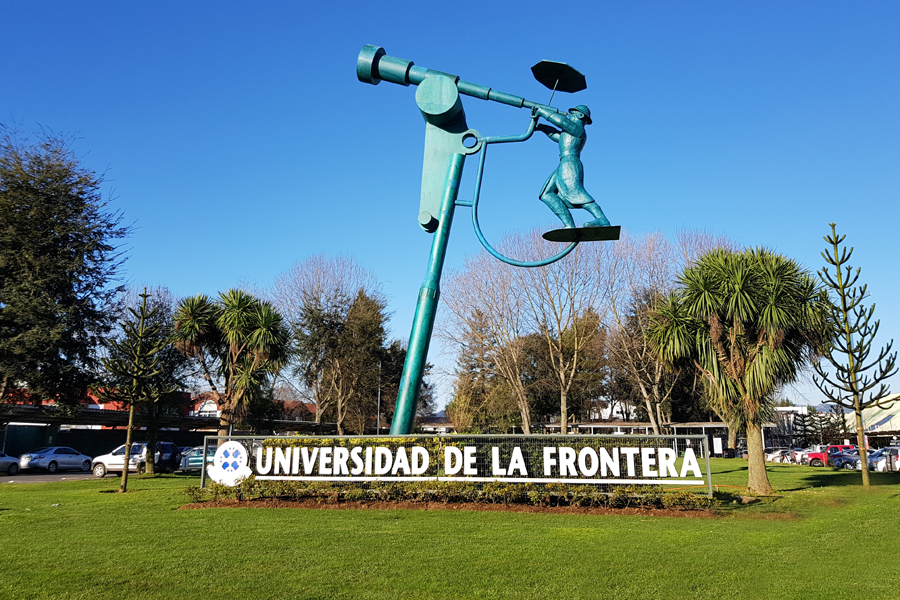|
The UFRO achieved to be in sixth place in the Universitas report in the Chilean newspaper El Mercurio and consolidates its leading position, although the ranking did not yet consider the institutional accreditation for six years by the National Accreditation Committee (CNA). |
The Universidad de La Frontera again achieved to be in a high position in the Ranking for Quality of Chilean Universities, made by the Chilean Universitas Group for Leading Studies in Higher Education (GEA) and the newspaper El Mercurio. According to the report the UFRO is in sixth position, out of nine higher education institutions in Chile, in Group 4 for Universities of Research and Doctoral Programs. The criteria to enter this group is that the university needs to have an offer of seven or more doctoral programs in three or more fields. GEA and El Mercurio put a special emphasis on the promising situation of the Universidad de La Frontera, although the ranking was made before the result of the CNA, that certified the institutional accreditation of the UFRO for six years in all areas, was published. The authors of the report explained that this result would have allowed the Universidad de La Frontera to be in fifth place in Group 4. This way, the UFRO consolidated its incorporation in Group 4 for Universities of Research and Postdoctoral Programs, in which it entered for the first time in 2017, making visible the institutional efforts to create knowledge through research of excellence that responds to the challenges of a dynamic environment, focused on the development of “science with sense”. In the general ranking for Quality of Undergraduate Teaching in 2018, the UFRO is among the ten best universities in the country, in 9th place. This ranking judges the universities based on four dimensions: Student quality (15%), teacher quality (25%), quality of the training processes (40%), and quality of institutional management (20%).
 Written by: UFRO Communications Office Written by: UFRO Communications OfficeThis email address is being protected from spambots. You need JavaScript enabled to view it. |
|
Obesity in women and childhood obesity are the fields of study of these researchers. Their work will be a great contribution to public health since they are trying to provide more information for the decision making in health in this country. |
Two professors at the Department of Public Health of the Universidad de La Frontera each have been awarded a FONIS (National Fund for Research and Development in Health) project in the recent competition of CONICYT (Chilean Committee for Research in Science and Technology) and the Chilean Ministry of Health. Dr. Teresa Balboa and Dr. Ximena Ossa will be developing important research during the next 30 months. “These FONIS projects allow us to continue with the line of research we are developing at the Faculty of Medicine. They strengthen our work in public health and will have a great impact on health policies in Chile,” the dean of the Faculty of Medicine, Dr. Patricio Valdés, said. The project competitions in the field of medicine are each time more competitive. Around 240 project proposals have been presented in the latest FONIS competition and only 22 of them have been awarded; two to the Department of Public Health of the Faculty of Medicine at the UFRO. CHILDHOOD OBESITY Teresa Balboa, a physical therapist and doctor in preventive medicine and public health, will be responsible for the project “Comparison of pediatric nutrition assessment methods in the measurement of malnutrition caused by excess in Chilean schoolchildren”, which will be financed with about 48 million Chilean pesos. “The problem we want to approach is childhood obesity and how to measure it in our children, for being able to recommend more adequate assessment methods,” Balboa stated. This project is dealing with the macro issue childhood obesity and some of the reasons why. “We want to determine how exact the anthropometric methods (How do they measure the children if they have a nutritional excess?) for the nutritional assessment in children are. Childhood obesity is a worldwide problem of public health and during the last 10 years the rate in Chile has been increasing. One of the problems to study it is that the methods are controverted because of the use of reference parameters of other studies or of the Centers for Disease Control and Prevention (CDC) in the USA.” Against this background, the aim of this project is to compare the different methods: Body mass index, skin folds, waist size. “Nobody knows which parameter measures obesity in children and the percentage of fat the best. There are no studies in Chile yet, which determine which anthropometric parameter is more precise to determine obesity in our children. We will compare the five anthropometric methods with the gold standard, which is the bone densitometry.” “It is easy to measure obesity in adults, but not in children, because of their constant changes of size and weight. This is why the methods are controverted: because children grow. It is a great achievement to get funds for this project,” Balboa said. OBESITY IN WOMEN “Excessive gestational weight gain: Trend and geospatial analysis in eight years, for the design of technical orientations in pregnant women from Temuco and Padre Las Casas”. This is the name of the project the midwife and doctor in public health, Dr. Ximena Ossa, has been awarded. This project is based on data of the reproductive outcomes from 2009 to 2016, of women who had their children in Temuco and Padre Las Casas during these seven years. “This project – with 30 million Chilean pesos for its execution – concentrates on obesity in women and we want to analyze the excessive gestational weight gain,” Ossa explained. “The recommendations of the Chilean Ministry of Health (MINSAL) regarding the weight gain during pregnancy are based on the nutritional status of the mother in her prenatal check-ups, where they receive the recommendation not to gain more than a certain amount of weight. These recommendations are not always put into practice and there are no studies in Chile on how this weight gain should be distributed exactly during pregnancy. We want to know what happens during pregnancy regarding the weight gain according to the nutritional status, but you have to wait until the woman has her baby in order to know how much weight she gained. In addition, we want to find out how this is related to the place the women live,” the researcher added. Obesity in women is a big problem in Chile and it is uneven distributed in our population. “In other words, and this is a fact that does not apply to men, obesity in women is significantly higher in families with a lower socioeconomic status. The reasons of this are not clear and one of the factors could be a pregnancy, since the changes of weight during pregnancy could explain the obesity. This is what we are going to study in Temuco and Padre Las Casas.” “We want to find out how much influence the different places of residence in Temuco and Padre Las Casas have on this weight gain during pregnancy and how we can prevent directly, once we have the data. All women gain weight during pregnancy, but the problem are the women who gain more weight than recommended and we don’t have concrete data on that, yet. In 2008, a study on women in Santiago de Chile showed that only 10% of the women who start their pregnancy with normal weight maintain their nutritional status within the category “normal” until their baby is born,” the researcher explained. “The more weight a woman has when she starts her prenatal check-ups, the more weight she will gain during pregnancy. This makes the problem even worse, but we have to do an even more precise analysis for being able to show what is happening based on real evidence. At the UFRO, we have a unique team of researchers who are dealing with obesity in women and this project is a new contribution to making these problems visual from its basis,” Ximena Ossa concluded. Both projects just started and will have a duration of 30 months. By then, we will know much more about childhood obesity and obesity in women in the Araucanía Region.
Written by: Fabián Aguirre
|
|
Dr. Jimena Obregón visited the UFRO with two intentions: to participate in the 6th Cycle of Dialogue about History, and to strengthen the partnership between both universities |
Within the framework of permanent activities in the field of history, organized by the Department of Social Science at the Universidad de La Frontera, the 6th Cycle of Dialogue about History took place, addressing the issue “Power on the Margins, Frontier, People and Territories”. One of the participants was Jimena Obregón Iturra, an outstanding professor at the University of Rennes, France. She added that she studied that period of time, because it is a century she had not studied enough and pointed out: “It caught my attention because, when I started to work, this specific period of time was the one that had been studied the least and that had a lot of particularities, because it is a moment apart in itself, precisely because of the indigenous slavery that was legal in that epoch.” Yéssica González, academic at the Department of Social Science in the field of history, expressed her respect for the professor: “Professor Jimena spoke about the indigenous uprising in the 17th century, but the fundamental discussion is more profound and a question of methodology that has to do with the way we now deal with the implications that have to use certain analytical categories for the construction of historical knowledge about the region, certain episodes and phenomena.” “The interesting, the methodological, is that the academy started a discussion in the field of history and social science at the end. This has to do with rereading our research, rereading what we have been doing. We started to ask ourselves about the magnitude and the effect that has to use certain concepts or categories of language, take charge of the burden, no matter the redundancy of this discussion,” González added. History is a discipline that needs and lives with the help of others. In this regard, the professor Yessica Gónzalez pointed out: “It seems to me that, regarding the level of this discussion, a lot of other more interesting and, at the same time, more flexible and more open topics will come up; it is a way to advance with what interests us, the democratization of knowledge and the mainstreaming of this topic, because that necessarily forces you to think about how to work together.” VISIT WITH A DOUBLE PURPOSE Besides of her lecture, Dr. Jimena Obregón visited the UFRO with another purpose that has to do with the joint work between the University of Rennes and the Universidad de La Frontera: to strengthen the student exchange and the collaborative networks between these universities. “This is interesting and challenging for us, because it permits us to strengthen our networks, which is the aim we focused on lately and, on the other hand, to start thinking about how to promote this kind of exchange, especially for undergraduate and postgraduate students,” the academic added. “I am trying to organize exchanges under the name of this new institution I am working for, the University of Rennes,” Dr. Obregón explained, and added: “What I want to promote now are agreements at the postgraduate level. Everything that has to do with the internationalization of the students’ training, so we can give them the opportunity to get to see another world, to discover another educative system and to return with an expanded horizon.” ASSOCIATED PROJECTS Diufro project 2018 DI18-0058: Bad women. Violence, criminality and justice practices at the margins. Concepción (Chile) in the 19th century. Diufro project 2018 DI18-0049: History of the Southern Cone revolutionary left in the 60th and 70th from a cultural perspective. Project: I+DHAR 2012-37394-MINECO (Chilean Ministry of Economy and Business).
 Written by: Claudia Palacios Written by: Claudia PalaciosFaculty of Education, Social Science and Humanities |
|
We are getting closer and closer to entering the top ten of prestigious universities in Chile, according to the University Ranking of the Chilean newspaper La Tercera, published in its 19th version this weekend. It judged 41 universities regarding dimensions, such as: Management Quality; Quality of the Academics, Students and Researchers; Perception of Quality in general and Perception of Quality by Study Program. |
In general, the Universidad de La Frontera achieved to be in 11th place, climbing one position compared to last year and positioning itself as one of the most important educational establishments in the country. This news also confirms the recent institutional accreditation for six years in all areas by the Chilean National Accreditation Agency CNA. “We are showing in Temuco, that it is possible to offer education of quality outside of Santiago, our capital. This new result reflects the constant and joint work of the Universidad de La Frontera´s whole university community for the preservation of quality and excellence in all our fields of action. We are convinced that, very soon, we will be one of the 10 most prestigious and important universities in the country in this ranking, which will be made possible thanks to the participation of everyone who is part of this higher education establishment,” Dr. Eduardo Hebel, the rector of the Universidad de La Frontera, said. The ranking judges dimensions, such as: Perception of Quality – regarding the labor market; Management Quality; Quality of the Students; Quality of the Academics; and Quality of the Researchers. Regarding the sample, the ranking considered the opinions of two thousand professionals in Chile, between October and November. Among the five dimensions the ranking considers, the dimension Management was the one that improved the most, what can be associated to the 6 years of institutional accreditation. The same thing happened with the dimension Research, which evaluates the productivity and quality of science, based on data obtained by the Ibero-American Ranking of Higher Education Institutions 2018. The UFRO achieved to climb three positions in this category compared to 2017 and is now in 15th place. Martha Ramírez, the director of Quality and leader of the self-assessment process that supported the institutional accreditation, commented: “It is gratifying to see that the university, as a result of the accreditation of quality, improved its position in this ranking. That has to renew our commitment with continuous improvement.” The other dimensions do not show significant changes regarding the scores, but regarding the positions. Perception of Quality, for example, maintained its score, but since other universities improved their performance, they had an influence on the position of our institution. In this regard, the UFRO director of Communications, Carola Espinoza, commented: “This ranking in particular is the one with the highest importance regarding the dimension Perception of Quality. This is why we consider this result as something that nurtures our strategies. This year´s performance consolidates the advances, and challenges us to find ways to keep impacting the reputation of the UFRO positively regarding this particular group of influencers.”
Written by: UFRO Communications Office
|
|
The fifth National Congress of Nanotechnology took place from November 25 to 29, and brought more than 200 scientists from Chile and important international guests together. One of the participants was Dr. Eduardo Cisternas, a researcher and the director of the Department of Physical Sciences at the Universidad de La Frontera and a member of the Millennial Nucleus for Nanotechnology (MultiMat), one of the organizers of this event. |
From this year on, the tourist capital in the south of Chile will not only be remembered because of the holidaymakers and sportsmen and women. Science was also present at the frontier, in the form of one of the most massive events in the past years: the 5th National Congress of Nanotechnology. This event was organized by several institutions, among which the Universidad Austral de Chile, Universidad de Chile, Pontificia Universidad Católica de Chile and the Millennial Nucleus for Nanotechnology (MultiMat), represented by the academic at the Department of Physics of the Faculty of Physical Science and Mathematics of the Universidad de Chile, Marco Flores, who pointed out that “this is a spectacular place, not only because of its natural beauty, but also because of its excellent infrastructure for this kind of events”, were standing out. NANOTECHONOLOGY, A LITTLE SCIENCE FOR GREAT SOLUTIONS “Nanotechnology studies the small things. In this universe, which is still quite unexplored but fascinating, we can find answers, for example, to problems of energy transformation and storage, electronics and even health,” Dr. Marcos Flores explained. During the event that took place at the Enjoy Hotel in Pucón, Chile, the scientists were presenting their research advances in different areas, such as: treatments for Alzheimer, water desalination processes, graphene-derived insulators, the formation of crystal liquids and the advantages of lithium batteries, among others. “This congress invites the whole national scientific community to analyze the frontier of knowledge in that field and, this time, we wanted to add a key mark… the link between science and the industry. We want that the solutions come out of the laboratory and improve people´s lives dramatically,” explained Judit Lisoni, director of the Millennial Nucleus for Nanotechnology and full professor at the Institute of Physical Sciences and Mathematics of the Faculty of Sciences of the Universidad Austral. REGIONAL IMPACT For the professor Eduardo Cisternas, academic at the Department of Physical Sciences of the Universidad de La Frontera and an expert in computer simulations and supercomputers, this initiative was extremely important. “The fact that this congress takes place outside of Santiago shows that things are changing in the right direction - the knowledge is distributed throughout the whole country,” Dr. Cisternas explained. “We hope that, in the short and medium term, the level of maturity of our scientific community reaches to conquer the industries. We are conscientious that this part of knowledge has its origin at the universities and it is our interest to transfer this technology and knowledge, and to file the respective patents,” Dr. Flores concluded. ABOUT MULTIMAT The Millennial Nucleus for Multifunctional Materials for Applied Surface Science, MultiMat, is a multidisciplinary group financed by the Scientific Millennial Initiative. Its aim is to develop advanced nanotechnology in Chile, with an emphasis on the field of lithium-ion batteries. Source: Chilean Millennial Nucleus for Nanotechnology, MultiMat
|





